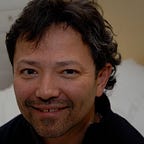Creative Philosophy, Part 2
Gilles Deleuze on what constitutes a vital philosophy.
This is a continuation of a discussion characterizing the philosophy of Gilles Deleuze as creative philosophy.
Concept Creation
In writing about his own concept creation, Deleuze states:
What is interesting about concepts like desire, or machine, or assemblage is that they only have value in their variables and the maximum of variables which they allow. (Dialogues II)
Vital concepts are not static, they mutate and connect. They do not point to the eternal or universal, but to the conditions under which something new is produced. The concept expresses an event in the process of becoming, not an essence.
Thought as Flow
The real genesis of concepts, the origin of thinking, is not the discovery of truth, but the flow of thought:
What is given, at the limit, could be called a flow [flux]. It is flows that are given, and creation consists in cutting, organizing and connecting flows, in such a manner that a creation is sketched out or made around certain singularities extracted from the flows… Imagine the universal thought flow as a kind of internal monologue, the internal monologue of everyone who thinks (Deleuze Seminar quoted in Daniel Smith, Essays on Deleuze)
Every event in thinking is singular, but thought overall is flow.
If being is difference, the creation of difference, the constant production of the new, then thought and concepts are temporal. And thought ceases to participate in the flow when it becomes normalized, coagulated.
Clearing Out Cliché
Philosophers, artists and scientists do not enter their activities with an empty, white surface on which to create. They come to their desks, canvases, laboratories, full with images, clichés, schemata, conventions, dogma.
Truly remarkable thought, the original and refreshing concept, the remarkable painting, the groundbreaking equation, comes only when the philosopher, artist, scientist clears out the canvas, destroys the clichés, and gains access to the pure chaos of their immanent plane, free to confront problems without the weight of solutions.
A Philosophy of Excess
Deleuze’s is a philosophy of excess. Excess displaces transcendence in his philosophy of difference.
In a reality of pure immanence, there are no transcendent forms or ideas beyond or governing or confining the plane. The plane overflows. There is more than meets the eye at first glance.
The virtual, difference-in-itself is real, exists in things, overflows images of things. And everything exists in relation to other things, everything connects, and disconnects and reconnects in a process of becoming. The subjective and objective of thought are effects only, temporary actualizations of the virtual processes of change and differentiation.
Naturalism as Affirmation of Life
Deleuze is a naturalist:
The speculative object and the practical object of philosophy as Naturalism, science and pleasure, coincide on this point: it is always a matter of denouncing the illusion, the false infinite, the infinity of religion and all of the theologico-erotic-oneiric myths in which it is expressed. (Logic of Sense)
The objective of philosophy as naturalism is to attack all that belittles life. It attacks the negative, and affirms the active forces of life. All life, not just from a human perspective, but life that is pre-individual, organic and inorganic; life that is becoming.
Constructivism as Creativity
Deleuze is also a constructivist: immanent thought creates movement, creates new concepts, not just opinion or consensus. Deleuze and Guattari cite Nietzsche on this point:
[Philosophers] must no longer accept concepts as a gift, nor merely purify or polish them, but first make and create them, present them and make them convincing. (The Will to Power)
The philosopher constructs thoughts of reality and our experience of reality, ways to look at it, conceive it, find the remarkable in it.
[P]hilosophy is the art of forming, inventing, and fabricating concepts. (What is Philosophy?)
Exploring the Open and New
Above all, pure thought in philosophy is exploring the open, exploring the new, exploring the vital.
Philosophy is lived philosophy. It is thinking differently, finding new perspectives, using language in novel ways; but it is aimed at something. It is aimed at living a life which affirms the active forces in life.
It is the radical freedom experienced when transcendence and the reactive forces have been discarded as illusions. It is the open frontier where life is lived as an experiment, a work of art.
A vital philosophy is at all times a discipline with the ultimate question: how might one live a fulfilling life?
I hope you enjoyed this article. Thanks for reading!
Tomas
Please join my email list here or email me at tomas@tomasbyrne.com.
Excerpt from my forthcoming book, Becoming: A Life of Pure Difference (Gilles Deleuze and the Philosophy of the New) Copyright © 2021 by Tomas Byrne. Learn more here.
